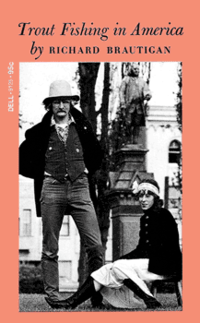About two years ago I was perusing the shelves of Louise Erdrich’s marvelous bookstore, Birchbark Books, in Minneapolis, Minnesota, when, inexplicably, as if magnetized or drawn by some irresistible sexual attraction, I plucked Richard Brautigan’s 1967 novella Trout Fishing in America off the shelf. I do not know why exactly, but I suspect I was intrigued by the title and certainly at least dimly aware of Brautigan’s once white-hot literary fame. Anyway, I hardly need an excuse at all. I’m a book junkie and that day I walked out with Trout Fishing in America, Erdrich’s The Round House, and Patti Smith’s autobiography, Just Kids. In the coming months, I finished The Round House (wonderful) and Just Kids (I have an unhealthy fascination with Sam Shepard, so those parts had me swooning) and about a dozen other books.
And then, a year went by . . .
Trout Fishing in America went unread.
But, one night, in search of a short book, I looked over my shelves, and there was Trout Fishing in America, a little over a hundred pages long, patiently waiting for me. I took it into bed and there devoured it in a matter of hours, which is rare for me because I’m a tediously slow and critical reader. I will reread a delicious page of perfect prose three, four, five times, just to savor it, to learn something. Conversely, I’ll reread a poorly written or confusing paragraph ten times because I just don’t get it. I skip nothing, I skim nothing, I read every single word. I also rarely abandon a book. In my lifetime I think I’ve given up on two or three books. I like to think of books as people: I don’t want to give up on people, either.
I’ve never read anything like Trout Fishing in America. I think of Brautigan’s masterpiece much like a freshly caught fish: slippery, beautiful, fragile, ephemeral. Every time I thought I understood what the book was “about” or “trying to say,” Brautigan slipped off my hook, out of my hands, in the most pleasant and elusive way. I wanted so much to isolate that which confounded me, that I raced through his words, his beautiful bucolic scenes, his oddly gorgeous dialogue. Since that first reading I haven’t stopped thinking about Trout Fishing in America. I delight in talking to booksellers and other readers about the book, in trying understand what it is exactly, that makes the book so magical.
One thing that is unmistakably noteworthy about the book is the wildly original, spunky, hallucinatory prose. Check this out:
The sun was like a huge fifty-cent piece that someone had poured kerosene on and then had lit a match and said, “Here, hold this while I go get a newspaper,” and put the coin in my hand, but never come back.
I’m pretty sure that somewhere in my writing, maybe multiple times in my writing, I’ve compared the sun to a coin. And I’ve read many other fine writers who have done likewise. But no other writer, to my knowledge, has ever dared to set that proverbial coin on fire, put it in someone’s hand, and then never come back to claim it. Even if you’ve never read Trout Fishing in America, my bet is that after reading that brief little excerpt, you can see that big ole fifty-cent piece on fire, feel it sizzling in your hand, glowing in your pocket. That’s what great writing is, a new portal into our so-called reality, a warp in the glass, a strange echo up through the ages. Remember, that coin in your pocket, it’s the sun. Brautigan put the sun in your pocket, man!
I wish I could promise that you’ll love Trout Fishing in America the way I do, but I can’t promise you that. As with most amazingly original novels, the more challenging a piece of art is, the less it is broadly accepted. However, you won’t forget Trout Fishing in America, I can promise you that. The book is a bit like meeting a very eccentric, possibly mentally unhinged stranger on the street who says something so cryptically beautiful, so insightful, so personal to you, that for a moment, he or she might also be an oracle, a prophet, or even a god. And whatever they whispered to you, in that one crazy moment, it’s the one thing that has always been irrevocably lodged in your psyche.
Like a fishing hook. A bright, shiny, sharp, silver hook.
Now then. Who caught whom?





